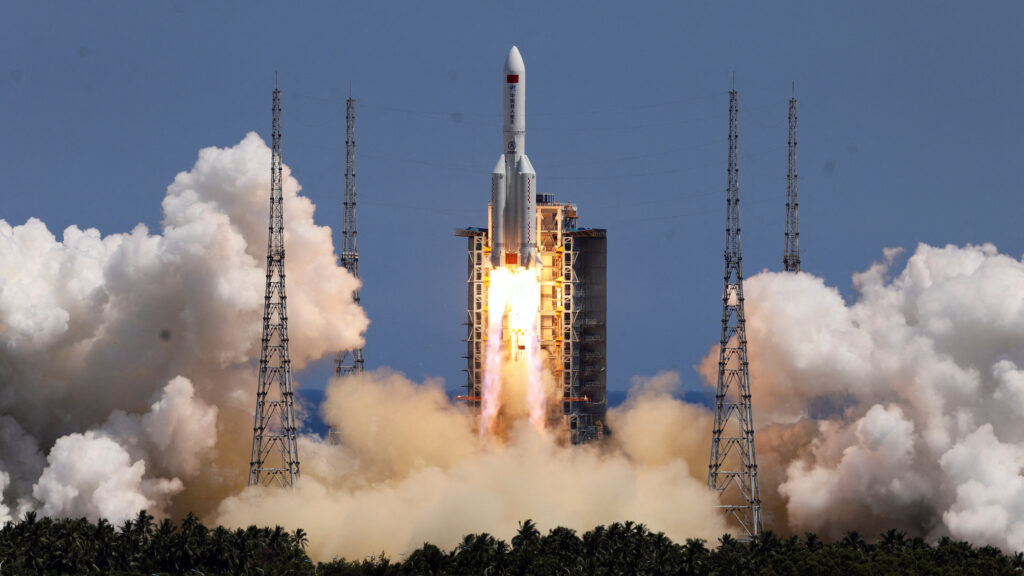
China has successfully launched a rocket carrying a fresh array of satellites.
On Tuesday, China successfully launched a Long March-6 carrier rocket, carrying a constellation of 18 new satellites, marking a significant advancement in its space capabilities. The launch took place from the Taiyuan Satellite Launch Center, located in Shanxi Province in northern China, at approximately early afternoon local time. According to official reports from the Xinhua News Agency, the rocket achieved its designated orbit as planned, without encountering any issues during its journey.
This latest mission is part of China’s ongoing efforts to bolster its presence in space and advance its technological prowess. The constellation of satellites carried by the Long March-6 rocket is expected to play a crucial role in various applications, ranging from communications and Earth observation to scientific research and national security. By expanding its satellite network, China aims to enhance its capabilities in these areas and strengthen its position in the increasingly competitive space sector.
China’s space program has seen a series of remarkable achievements in recent years. The country has conducted numerous crewed space missions, including the successful deployment and operation of its own space station. This station, which supports a rotating crew of three astronauts, represents a significant milestone in China’s ambition to establish a sustained human presence in space. Additionally, China has made substantial progress in lunar exploration. Its Chang’e missions have successfully landed rovers on the Moon, with the most recent mission bringing back valuable samples of lunar rocks and soil.
Another notable achievement is the development and deployment of the Beidou Navigation Satellite System. This system, designed for national security, communication, and scientific purposes, serves as China’s counterpart to the Global Positioning System (GPS), which is primarily operated by the United States. The Beidou system is intended to provide a reliable and independent navigation service for China and its allies, reducing reliance on foreign technology and enhancing strategic autonomy.
The launch of the new constellation is part of a broader strategy to expand China’s influence and capabilities in space. The satellites are expected to contribute to a wide range of applications, including improved communication networks, enhanced weather forecasting, and more precise Earth observation. These advancements align with China’s long-term goals of becoming a global leader in space technology and exploration.
China’s space ambitions are also driven by the desire to compete with other major spacefaring nations, particularly the United States. The growing rivalry in space technology underscores the geopolitical significance of space exploration and satellite deployment. By developing its own satellite constellations and space infrastructure, China aims to establish a more robust and self-reliant space program, capable of challenging the dominance of traditional space powers.
The successful deployment of the 18 new satellites further demonstrates China’s capability to execute complex space missions. The Long March-6 rocket, known for its reliability and performance, has been instrumental in China’s space endeavors. Its successful launch of the satellite constellation underscores the continued progress and innovation within China’s space program.
As China continues to advance its space capabilities, it is also working on other ambitious projects. These include plans for future lunar exploration missions, the development of space-based infrastructure, and the pursuit of technological advancements in satellite communication and Earth observation. China’s commitment to expanding its space program reflects its broader goals of technological leadership and strategic influence on the global stage.
In summary, the recent launch of the Long March-6 rocket carrying 18 new satellites marks a significant milestone in China’s space program. This achievement highlights China’s ongoing efforts to enhance its space capabilities and assert its presence in the competitive field of space technology. With a growing focus on satellite deployment, space exploration, and technological innovation, China is positioning itself as a major player in the global space arena. As the country continues to push the boundaries of space exploration, it will undoubtedly make further strides in advancing its space program and achieving its ambitious goals.
